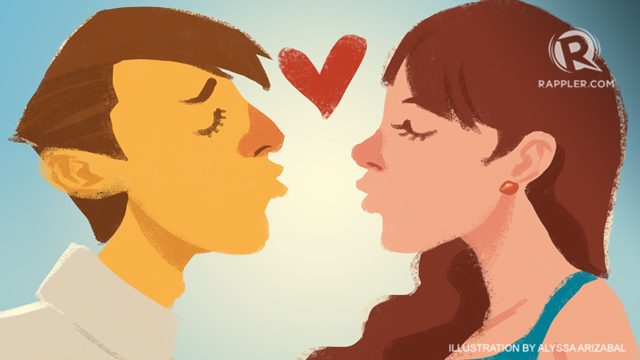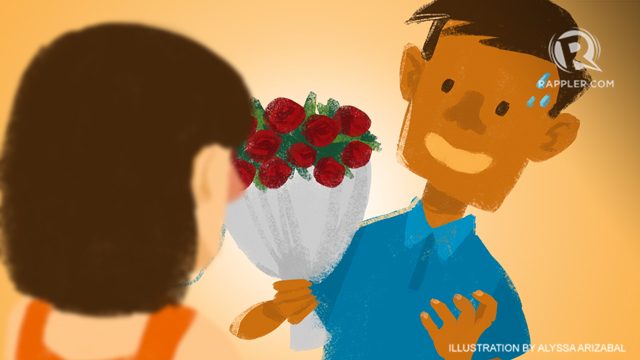SUMMARY
This is AI generated summarization, which may have errors. For context, always refer to the full article.

If you had to consult about your messy love issues during the Middle Ages, perhaps, you had to get an appointment with a witch to brew you a mighty potion. If you were English, you could maybe watch Romeo and Juliet and find a mirror held up to your barb-wired kind of love. If you were Pinoy about 50 years ago, you probably had to serenade her or bring a group who could, so you could earn a date with her under a tree that you could wound with your arrow-connected names, betting that your future lives will be too.
But it’s 2017. You now have other options, grounded in scientific studies, that could give you some air, gain a larger view of what love is, before you plunge again into that experience that the late great poet and songwriter Leonard Cohen penned as “a thousand kisses deep.”
For starters, even if you are positive that you are the one having the time of your life when in love, you should know that you and your partner are also venues for some other love fest: that of microbes. Microbes account for a lot of diseases but also for our well-being. For instance, if you think your choice of accessory, hair product or make-up gets your special someone to look at you, science has reason to suspect that there is a probiotic (“good” bacteria) that works to give you good hair and good skin. We know this because when researchers isolated a probiotic found in human breast milk and fed it to mice, their fur developed a quality that was celebratory that if it were human, it would have been a commercial model for hair and you will see it in billboards in EDSA!
Female mice who took the probiotic also saw that a protein that guards against inflammation and helps ensure successful pregnancies shot up as did a hormone, often called the “love hormone”, oxytocin, responsible for feelings of bonding and trust. Oh, and further studies by these researchers saw that male mice who had yogurt, aside from more fur, got the jackpot: larger testicles than those of their now envious peers, and more testosterone to boot. By keeping you, their host, healthy (which in nature’s raw language means “sexually active and productive”), microbes keep themselves alive. Thus when partying in love, know that you are also host to your microbes’ own Woodstock.

And of course, when you kiss, you build the San Juanico Bridge for your microbes and your partner’s microbes to traverse. A study that had couples kissing for 10 seconds long found they transferred about 80 million bacteria to each other and those who kissed at least 9 times a day shared more than meals, a bed and bathroom – they also shared communities of microbes. Eighty million in each kiss may sound a lot because that is about the population of Germany but when you are talking about microbes which number about 100 trillion in each of us, that is just a neighborhood party. And if loving could be a thousand kisses deep, then just do the math and you can just imagine the migration of microbes in and out of your “couplehood”. Scientists think that because of these microbial exchanges that happens when you kiss, it steps up your immune system, boosting your chances for successful reproduction.
And let us not forget the bacteria that accounts for the way we smell. Yes, it is bacteria that accounts for the way we smell and not human sweat because the latter is odorless. In fact “body odor” or “BO” for short, should really be “VO” as the mix of microbes that accounts for the way you smell refers to “volatile organic compounds”. In a study that revealed that when females were asked to choose the ones they were attracted to by smelling the shirts of different males (the shirts were worn by the men overnight, removed and placed in containers), the females turned out to be attracted to the ones with a different immune system than theirs.
There is also the story of hormones and neurotransmitters inside you when you love. Even before you embark on the first of a thousand kisses, your brain is flooded with hormones that, in addition to making you feel so high with positive emotions and feelings of reward, real or anticipated, dims your reasoning at least when it comes to your beloved. And when you look at the one you love or even just their photographs, your brain also gets a shot of the “feel-so-good” hormone dopamine and that is why you want to see your beloved again and again. Even if you have problems, you remember the rewarding feeling and you want that feeling again. This is how love can be addicting.
The stress hormone cortisol also plays a major role in that it sees being in love as a crisis, which accounts for your clammy hands and racing heart when anxious about your love relationship. Serotonin, which is your mood leveler also gets “disturbed” when you begin to plunge into this seeming abyss which at least promises to be a thousand kisses deep. Thus, you get moody – feeling so down when s/he does not reply within a nanosecond.

If you know a biologist and ask his or her professional definition on what love is, it will most likely read like this: “an evolved emotion meant to solidify pair bonds in species that require intensive parental care of dependent young or to strengthen social relationships that lead to access to food or protection from predators.” Biology says love is a slave to nature’s ends which is reproduction. Love makes biological sense. Loving gets all our insides ready to abide by nature’s intentions to move on.
In an engaging Ted Talk about how we could talk better about love, Mandy Len Catron asks us maybe we should refer to our love encounters as more of a “stepping into” rather than a “falling into” because words matter – they affect how we view our experiences and thus, how we will react to them. She thinks that even if there was basis that love is akin to a disorder, even madness, we have to find new words to describe it because it could help us gain some inner scaffolds to help us scale the wells from where those kisses buried us.
It seemed reasonable until I realized you could also “step into” a land mine. But she thinks “stepping into love” implies a collaboration which love should be, if it were to grow, rather than a force which grabs you and your partner to fall into and thereby rendered powerless to scale.
I think the best thing about love is that we fall into it, we step into it, we burst into it, we fly with it, we shatter with it, we are born and reborn because of it and we matter when we die because of it. It is no flat terrain. Every love story has its own spikes. It is as un-mappable as a thousand kisses deep. – Rappler.com
Add a comment
How does this make you feel?
There are no comments yet. Add your comment to start the conversation.